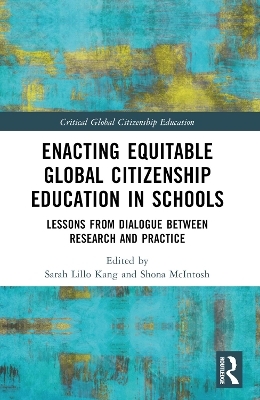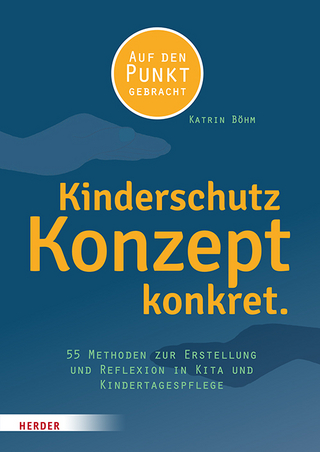
Enacting Equitable Global Citizenship Education in Schools
Routledge (Verlag)
978-1-032-14944-8 (ISBN)
Offering contributions and vignettes from teachers, school leaders, and scholars, this volume purposefully dismantles practitioner-academic divides to invite dialogue around diverse understandings of global citizenship education (GCE).
Recognizing that the field of GCE is often explored and conceptualized by educators and academics in silos, this book confronts this issue by focusing on how schools, educators, and researchers can together support the enactment of GCE in international and national settings. In doing so, issues of westernization, inequality, access, and divergence between GCE policy and practical implementation can be overcome. The novel dialogical format links together theory, practice, and lived experience to create discourses between voices that are rarely connected. Ultimately, this volume offers important insights for those aiming to make equitable GCE a reality in schools worldwide and illustrates the value of collaborative dialogic exchange.
This text will benefit scholars, academics, and students in the fields of international and comparative education, the sociology of education, and citizenship more broadly. Those involved with multicultural education policy and citizenship in the context of political sociology and social policy will also benefit from this volume.
Sarah Lillo Kang is Assistant Professor of Middle and Secondary Education at Southeast Missouri State University, USA. Shona McIntosh is Lecturer in International Education at the University of Bath, UK.
Introduction: Critical Discussions of Global Citizenship Education in the Third Space
Sarah Lillo Kang & Shona McIntosh
Part One: Dismantling Normative Understandings of Global Citizenship Education
One: Decolonizing Global Citizenship: Contesting Normative Conceptions of Global Citizenship Education Shamayim Watson, Shona McIntosh, and Andrew Watson
Two: Challenging Universalisms: A Critical Dialogue about Humanist Assumptions of Global Citizenship Education
Victoria Wasner, Hesham Elnagar, Brigitte Kürsteiner, Stefanie Rinaldi, and Greg Slosek
Three: Is Global Citizenship a ‘Pedagogy for the Privileged’?
Stacey Jones & Alysa Perreras
Four: Contrasting Perspectives on Global Citizenship in Practice: What can International Schools Deliver?
Tristan Bunnell and Adam Poole
Five: How Does National or Transnational Identity Influence Students’ Understandings of Global Citizenship?
Angela Gascho, Ana-Daniela Tavsancea, and James O’Donnell
Six: Global Footprints: Reflections of International Baccalaureate Alumni on their Transformative Personal Journeys
Naaz Kirmani and Young Jae Chang
Part One Conclusion: Dialogues Across Silos
Shona McIntosh, Sarah Lillo Kang, and selected Part One contributors
Part Two: Optimizing Global Citizenship Education Practice through Dialogic Exchange
Seven: Accreditation and Recruitment in International Schools: Divergences Between Global Citizenship Education Ideals and Practice
Richard Dean Eaton and Estelle Baroung Hughes
Eight: Using Explicit Curricular Aims to Drive Global Citizenship Education: Global Citizenship-Orientated Curricula in Two African Contexts
Sarah Lillo Kang, Tara Merks, and Seidu Sofo
Nine: Developing Global Citizenship Education Skills and Understanding amongst Students through Deliberate Pedagogical Choices
Kimberley Daly, Laurence Myers, Anne K. Horak, and Dana L. Plowden
Ten: Reframing Service Learning Experiences and Practices Through Critical Reflection
Rebecca Gillman, and LeeAnne Lavender
Eleven: Educating Students, Teachers, and Leaders to Recognize and Address Systemic Oppression
Virginia Araceli Feliz, Karla M. Prince-Cheng, and Tahsin Khalid
Twelve: Preparing Globally-Minded Educators: The Role of International Experiences in Pre-service Teacher Education
Debra Williams-Gualandi, Brandy Hepler, Diana Rogers-Adkinson, and Rosa María Retamales
Thirteen: Young Global Citizens, Eco-Anxiety, and Climate Activism: An Intergenerational Conversation
Elouise Mayall and Caroline Hickman
Part Two Conclusion: Dialogues Across Silos
Sarah Lillo Kang, Shona McIntosh, and selected Part Two contributors
Conclusion: Lessons from Purposeful Dialogues on Equitable GCE
Sarah Lillo Kang and Shona McIntosh
| Erscheinungsdatum | 05.09.2022 |
|---|---|
| Reihe/Serie | Critical Global Citizenship Education |
| Zusatzinfo | 1 Tables, black and white |
| Verlagsort | London |
| Sprache | englisch |
| Maße | 152 x 229 mm |
| Gewicht | 453 g |
| Themenwelt | Sozialwissenschaften ► Pädagogik ► Schulpädagogik / Grundschule |
| Sozialwissenschaften ► Pädagogik ► Schulpädagogik / Sekundarstufe I+II | |
| Sozialwissenschaften ► Politik / Verwaltung | |
| ISBN-10 | 1-032-14944-2 / 1032149442 |
| ISBN-13 | 978-1-032-14944-8 / 9781032149448 |
| Zustand | Neuware |
| Informationen gemäß Produktsicherheitsverordnung (GPSR) | |
| Haben Sie eine Frage zum Produkt? |
aus dem Bereich


